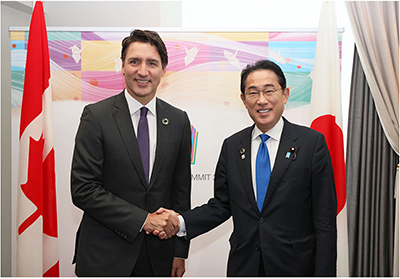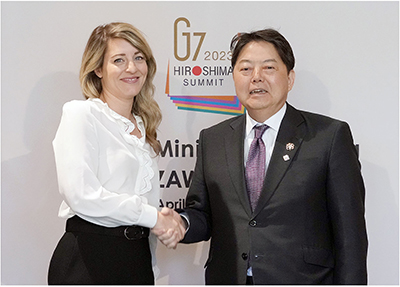Diplomatic Bluebook 2024
Chapter 2
Resilient and Unwavering Regional Diplomacy
3 Canada
(1) Situation in Canada
In July, Prime Minister Justin Trudeau shuffled his cabinet in an attempt to revive the Government's stagnant approval rating. He continued to appoint women to key cabinet posts, including Deputy Prime Minister and Minister of Finance Chrystia Freeland and Minister of Foreign Affairs Mélanie Joly, maintaining an equal number of men and women in the cabinet. With a cabinet that is more focused on economic issues of public concern, the Trudeau administration is prioritizing creating jobs for the middle class while pursuing bold climate change policies, as well as working to create a diverse and inclusive society that is considerate of indigenous peoples, LGBTQ people, and immigrants.
On the economic front, the economy is easing up due to the downturn in the global economy, and according to the Fall Economic Statement released by the Department of Finance Canada in November, the real GDP growth rate in 2023 is expected to be 1.1% (3.4% last year), the unemployment rate to be 5.4% (5.3% last year), and the annual average of the Consumer Price Index (CPI) to be 3.8% (the annual average of 6.8% last year). In order to ease inflationary pressures, the Bank of Canada raised its policy interest rate seven times in 2022 and three times in 2023, from 4.25% to 5.0%. The inflation trend will continue to be a focus of attention.
On the diplomatic front, in accordance with the Indo-Pacific Strategy announced in November 2022, the Government dispatched three frigates to the Indo-Pacific region and strengthened the presence of Canadian Armed Forces. In the economic and trade fields, Canada further strengthened cooperation with like-minded countries in the region to strengthen supply chains and maintain the high standards of the CPTPP and continued to further strengthen its engagement in the Indo-Pacific region. In September, Canada established a “Strategic Partnership” with ASEAN and set out to strengthen cooperative relations, including cooperating in addressing security issues such as cybersecurity, maritime security, and nuclear non-proliferation, and agreed to aim to reach a final agreement on the Canada-ASEAN Free Trade Agreement (FTA) by 2025. In response to the situation in Ukraine, Prime Minister Trudeau visited Ukraine in June for the second time following his visit in May 2022. In September, Ukrainian President Volodymyr Zelenskyy and his wife also visited Canada. Canada continued to actively implement severe sanctions against Russia and support Ukraine and signed a modernized Canada-Ukraine Free Trade Agreement.
Tensions also remain in relations with China, with both countries designating their respective consuls as persona non grata (an undesirable person) in May, and in October the Government of Canada announced that there had been incidents of intercepts of Canadian military aircraft and helicopters by Chinese military aircraft. On the other hand, there have been cases of cooperation with China in areas such as the environment, including Minister of Environment and Climate Change Steven Guilbeault's visit to China in August. In relations with Taiwan, a Foreign Investment Promotion and Protection Arrangement was signed between the Canadian trade office in Taipei and the Taipei Economic and Cultural Office in Canada in December, and the Taipei Economic and Cultural Office in Montreal was opened in the same month. In response to the situation in Israel and Palestine, Foreign Minister Joly visited the Middle East and announced that the Government of Canada would provide humanitarian assistance totaling 60 million Canadian dollars (approximately 6.6 billion Japanese yen).
(2) Japan-Canada Relations
From January 2023 to the end of January 2024, three summits and five foreign ministers' meetings were held between Japan and Canada.
Prime Minister Kishida visited Ottawa from January 11 to 12 and exchanged views with Prime Minister Trudeau on Japan-Canada relations and regional situations. Prime Minister Trudeau expressed his full support for Japan's new National Security Strategy and cooperation toward the success of the G7 Hiroshima Summit.
On April 18, Foreign Minister Hayashi met with Minister of Foreign Affairs Joly, who was in Japan to attend the G7 Foreign Ministers' Meeting. The two ministers exchanged views on the situation in Ukraine and East Asia, among other issues, and Foreign Minister Hayashi welcomed Canada's extension of its illegal ship-to-ship transfer monitoring activities.
 Japan-Canada Summit Meeting (May 19, Hiroshima Prefecture; Photo: Cabinet Public Affaires Office)
Japan-Canada Summit Meeting (May 19, Hiroshima Prefecture; Photo: Cabinet Public Affaires Office)On May 19, Prime Minister Kishida met with Prime Minister Trudeau, who was visiting Japan to attend the G7 Hiroshima Summit, and the two leaders concurred that they would work together to demonstrate to the world the G7's unwavering solidarity in addressing the various challenges facing the international community, as well as to work together to realize FOIP and launch the official negotiations on a Treaty between Japan and Canada on Mutual Legal Assistance in Criminal Matters.
 Japan-Canada Foreign Ministers' Meeting (April 18, Tokyo)
Japan-Canada Foreign Ministers' Meeting (April 18, Tokyo)On November 7, Foreign Minister Kamikawa met with Minister of Foreign Affairs Joly, who was visiting Japan to attend the G7 Foreign Ministers' Meeting, and reaffirmed their responses to the Israeli-Palestinian situation, and issues concerning China and North Korea, as well as efforts toward realizing FOIP. Furthermore, the two countries concurred to deepen cooperation on WPS, which was undertaken by both Foreign Minister Kamikawa and Foreign Minister Joly and is included in the “Japan-Canada Action Plan for contributing to a free and open Indo-Pacific region,” announced in October 2022.
On November 16, Prime Minister Kishida met with Prime Minister Trudeau during the APEC Summit, and the two leaders shared the view to address the Israeli-Palestinian and regional situations and to work together on the CPTPP. In addition, they recognized the progress made in efforts by both countries in 2023 to realize FOIP, including the strengthening of cooperation in the security field following the increased presence of the Canadian Armed Forces, the signing of Memoranda of Cooperation in the field of economic security, and the visit of a trade mission to Japan. The two leaders also confirmed cooperation toward the success of Expo 2025 Osaka, Kansai, Japan.
On January 13, 2024, Foreign Minister Kamikawa visited Foreign Minister Joly's hometown of Montreal for a Japan-Canada Foreign Ministers' Meeting. Minister Kamikawa expressed her gratitude for receiving words of sympathy from the Government of Canada for the affected areas and victims of the Noto Peninsula Earthquake and the Haneda Airport runway collision. The two foreign ministers exchanged views on various issues, such as the situation in the Indo-Pacific region and the Middle East. In addition, in regard to Russia's aggression against Ukraine, Foreign Minister Kamikawa, touching on her own visit to Ukraine, expressed that Japan would take the lead in demonstrating solidarity with Ukraine, including contributions to efforts based on the WPS perspective. The two foreign ministers confirmed the progress of the “Japan-Canada Action Plan for contributing to a free and open Indo-Pacific region,” and concurred that they would work closely together on the CPTPP, people-to-people exchanges, the success of Expo 2025 Osaka, Kansai, Japan, and to achieve a world without nuclear weapons.
In the field of economy, in September, two memoranda of cooperation, the Memorandum concerning Battery Supply Chains and the Memorandum on Industrial Science and Technology, were signed among relevant ministers and officials from the two countries. From the end of October to early November, a trade mission of Canada (with participation from over 150 Canadian organizations) led by Minister of Export Promotion, International Trade and Economic Development Mary Ng visited Japan to discuss the possibility of further collaboration with Japanese companies.
Five years have passed since the CPTPP, the first economic partnership agreement between Japan and Canada, entered into force, and trade and investment relations between the two countries have further deepened. In January 2024, the 33rd Japan-Canada Joint Economic Committee (JEC) was held in Ottawa to exchange views on recent international economic developments, including CPTPP, WTO, and Japan-Canada cooperation, including the realization of FOIP. In addition, discussions were held on six priority areas of cooperation ((a) energy, (b) infrastructure, (c) science, technology, and innovation, (d) tourism and youth exchanges, (e) improving the business environment and promoting investment, and (f) agriculture).
